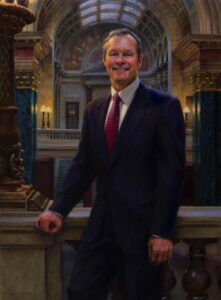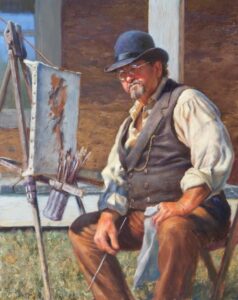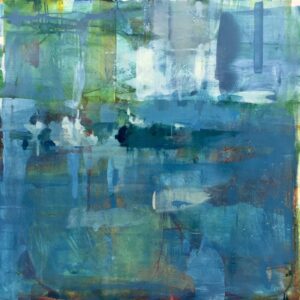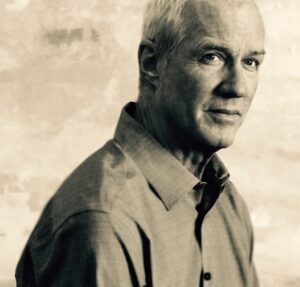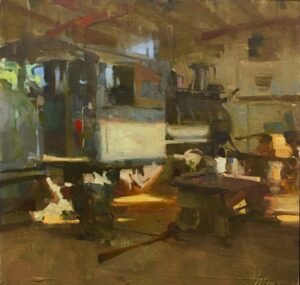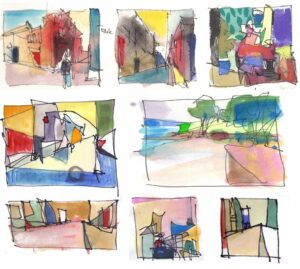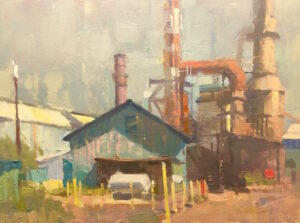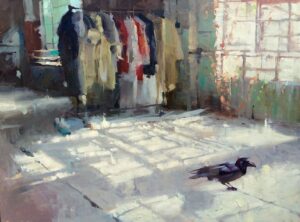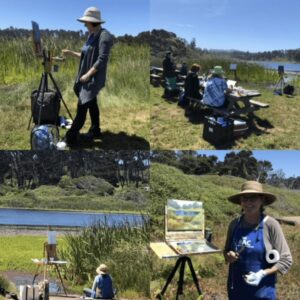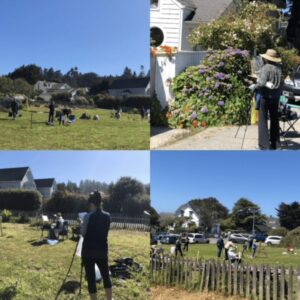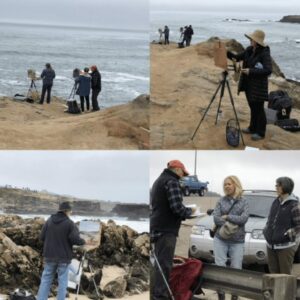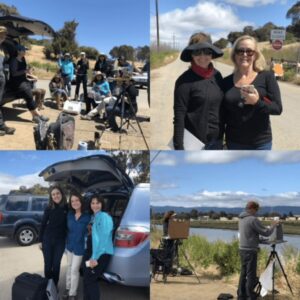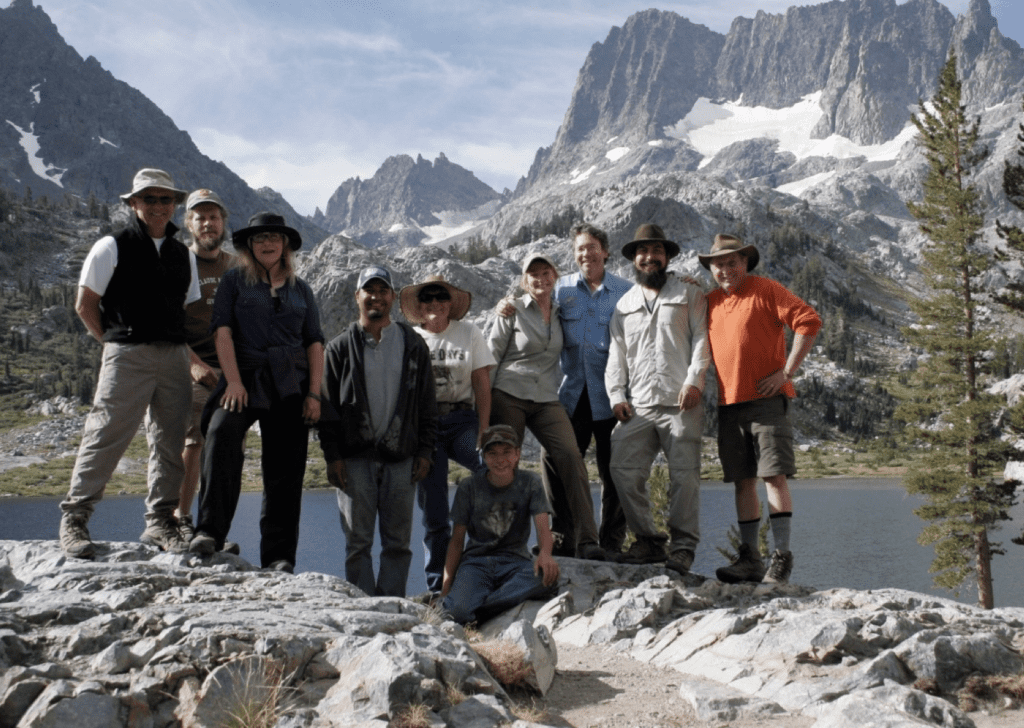You’ve spent your life hoping to learn the ‘secret’ to becoming a better artist – while being told there are no secrets. Well maybe not, but I have come to believe there are two ‘KEYS’ that can help you open the doors leading down that secret hallway. These two keys are separate but complementary, and together they can drive you as far as your desire to become a better artist will allow.
In this essay, I’ll share the two Keys, and briefly touch upon their breadth and depth. The first is: ‘Awareness’, and the second is ‘Preparation’. ‘Awareness’ comes from truly paying attention to the physical, intellectual and emotional aspects of ‘Art’, while ‘Preparation’ will provide you with the tools to express the depth of your awareness.
We all begin with a very basic level of Awareness. Our understanding of the physical world is akin to a child’s vocabulary; we can describe the basics, but it takes years of study and growth to become eloquent. When Louis Armstrong says he sees “skies of blue and clouds of white,” you know through experienced observation how much more there is to ‘see’ in those skies, and if you’re honest with yourself you know there is also so much more in terms of breadth and depth that is beyond your grasp, regardless of your current level of accomplishment. With each passing day, you can become more sensitized to the endless subtleties that add to the beauty and meaning of all you see and subsequently what you create.
Over and above physical observation, as you develop as an artist it is important that your work become infused with what you think and feel. The deeper your intellect and the stronger your feelings grow, the more your work can reflect your personality and soul. This depth can come from an endless variety of sources, and is in part a natural outgrowth of your maturity. When I was traveling the world to curate a collection of art, it became clear that there were a number of young artists who had great talent, but the profound effect of life creates a patina that adds richness to a mature artist’s work.
Our lives are filled with emotional and intellectual stimuli. Some artists naturally soak it all in and let it influence their work immediately, while others carefully observe and slowly massage their response into their creative output. I am conscientiously infusing more of myself as I define my intent for each piece, whether it be en plein air or in the studio.
Building artistic awareness is a continual endeavor, whether it comes from external forces or internal exploration, and it can also come from studying the work of other artists. Though seeking a ‘style’ might be a superficial pursuit, it is helpful to pay attention to your reaction to existing work. While some pieces may do nothing for you (learn why!), other work may really float your boat on an intellectual or emotional level, and it is helpful to be ‘aware’ of the elements you can incorporate into your efforts over the days and years to come. When I teach a workshop, the theme may be focused on portraits or animals, but I’m always infusing my personal instruction with elements affected by what I’ve begun to understand along with thoughts that can affect how a student approaches their future study.
The exploration of ‘Awareness’ is endlessly intriguing, but expressing your level of awareness takes ‘Preparation.’
From your palette, lighting, and studio set-up to your ability to draw, ‘Preparation’ comprises all the elements that enable you to execute your vision. Just as a weekend golfer hopes to hit the ball squarely while a professional will develop a myriad of shots, an artist’s success will increase as the many facets of preparation become more proficient and refined.
For instance, as we learn to draw, our lines and shapes may start to roughly define an image, and as we continue to evolve our lines and shapes become more convincing, and eventually, expressive. As you practice mixing your colors, the sensitivity and beauty of your values, temperatures and harmonies overcome clumsiness and begin to sing. Your first brushstrokes may be coarse and weak; with additional mileage and attention to how and why you’re mixing and laying paint will lead to improving surface, edges and presence.
Though we can learn from millions of examples, I’ll use an image of a painting by John Singer Sargent to illustrate how the combination of awareness and preparation can create fabulous work.
The reason I’m using this particular example is because years ago an artist posted it as an example of the ‘simple’ shapes Sargent used. When I saw the image, I was immediately struck – not by simplicity – but by spectacular execution of sublime understanding of value and hue. Using the original sketch at the left, the images on the right each show two columns of dots: one column of dots samples the color and value from the area immediately below, and the column next to it from the area immediately above. Seeing how Sargent deftly handled these transitions can help guide your process.

Because improved execution must be learned and then applied, your level of preparation will naturally trail your level of awareness. Therefore, it is helpful to understand that there is the potential for a perpetual satisfaction gap between what you hope your work will convey and what you are actually able to convey. There are times where we feel we’re actually getting worse! When you look back upon your earlier work, the gap will be more evident between what you’ve accomplished and where your head is now.
As my personal Awareness and Preparation grow, I am able to adjust my approach, execution and finish to accurately express my initial intent. Here are two ‘portraits’ that result from very different objectives. In the portrait of former Wisconsin Governor Scott McCallum, the composition, finish and atmosphere were focused on celebrating an accomplished ‘hero’ in the beautiful environment where he served as State Senator and also governed our State through the 9/11 crisis. In the second painting, I wanted all my elements to convey my ‘earthy’ response to a rugged, itinerant artist in the southwest United States during the 19th century.
by Bill Suys OPA
44″ x 32″
by Bill Suys OPA
20″ x 16″
Throughout your life and career, the areas and options for improvement are endless and each specific need is esoteric and unique to you. Answers will appear from many sources; workshops, individual study and serendipity. One of my reasons for teaching is that working with students at varying levels and areas of skill highlights and reinforces specific opportunities to strengthen awareness and preparation for both students and teacher.
I believe if you keep my two ‘Keys’ in mind as you approach your study and growth, they will help organize your efforts and clarify needs as they arise. You will also find yourself blessed with moments of illumination where your understanding or facility clearly take a little leap forward!
